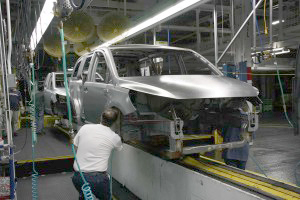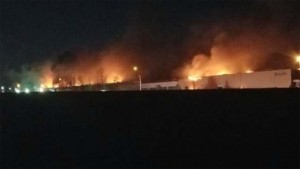
The shutdown happens just as Ford hoped to boost F-150 demand with the addition of a new diesel model.
Hours after a top official warned of a “fluid situation,” Ford Motor Co. said it is shutting off the tap on its most profitable and popular product line, its F-150 pickup.
The move follows a fire at a Michigan plant producing critical components for the truck. The incident also impacts some production at General Motors, Fiat Chrysler Automobiles and Mercedes-Benz. But Ford appears to be the hardest hit, especially considering the booming demand for its full-size pickup which has been the nation’s best-selling motor vehicle for decades, nearly 900,000 F-150s sold last year.
Ford temporarily laid off workers at its truck plant in Kansas City earlier this week and Joe Hinrichs, executive vice president of Global Operations, said early Wednesday that the automaker faced a “fluid situation” as it struggled to find an alternative source for the magnesium radiator supports used in its F-150 line-up. Hours later, the automaker also said it would idle the Dearborn Truck Plant near its suburban Detroit headquarters.
All told, 7,600 workers at the two plants will be directly impacted, 4,000 of them in Dearborn, 3,600 in Kansas City. But the layoffs are likely to spread rapidly as Ford will almost certainly trim production of engines, body panels and other parts and components in the F-150, while its suppliers will also cut production until the pickup lines begin rolling again.
Ford, meanwhile, is, for now, continuing production of its Super Duty line-up of heavy-duty pickups at a plant in Avon Lake, Ohio. It is not clear how long that will be able to continue, but the company has already idled Super Duty Production at its fourth F-Series plant in Louisville, Kentucky. That plant also builds two full-size SUVs, the Ford Expedition and Lincoln Navigator which are not impacted by the parts shortage.
The crisis began last Wednesday when an explosion and fire knocked out production at a plant run by Meridian Lightweight Technologies in Eaton Rapids, Michigan, about 80 miles from Detroit. It is the only U.S. source of those support beams, as well as other components used by some of Ford’s competitors, including the cross car beams that instrument panels in some Fiat Chrysler products are mounted on.
It is unclear how soon Meridian will be able to restart production and whether Ford and the other manufacturers will be able to find alternative sources. The incident underscores concerns raised by some suppliers who worry about the auto industry’s turn towards sole sourcing, or relying on a single parts manufacturer, for critical vehicle pieces.
Demand for the F-150 has been so strong that the automaker could be unable to recover lost sales in the near-term by increasing the line speed at Dearborn and Kansas City or adding more overtime. So, the impact of the fire is almost certain to be felt on Ford’s bottom line when it reports its second-quarter earnings, especially if the shutdown lasts more than a matter of days.
“While the production shortage is expected to have an adverse impact on the company’s near term results, the company’s guidance of delivering an adjusted EPS in the range of $1.45 to $1.70 for the full year is unchanged,” Ford said in a late Wednesday statement.
The broader F-Series line-up, including Super Duty models, is Ford’s most profitable vehicle, analysts estimating the company makes $10,000 or more on all but base models. And it continues to sell more and more of its higher-priced trucks. The average F-Series truck went out the door at $46,700 last year, according to the automaker. That works out to more than $42 billion in annual revenues alone.
“It takes 76 days for an F-150 to sell, so the company does have bit of a cushion,” said Ivan Drury, Edmunds senior manager of industry analysis. “But when you have a vehicle that comprises a quarter of your company’s sales, any production disruption is going to cause some consternation.”
As difficult as the loss of F-150 production might be, the situation will get worse if it also impacts the second Super Duty plant. Prices have been on the rise as Ford has continued to explore the upper limits of the F-Series, recently adding a Limited Series for the Super Duty that can approach $100,000 when fully loaded – pushing into Mercedes-Benz territory, the maker’s flagship S-Class sedan starting at just over $89,000. Based on price, in fact, some analysts consider Ford Motor Co. the country’s best-selling luxury manufacturers, not because of its Lincoln brand but the F-Series.
“We are working closely with our supplier and UAW partners to do everything we can to limit the impact on our production,” Hinrichs said Wednesday, but it is unclear what alternatives the automaker has. Due to the extent of the fire, it is unclear whether Meridian will be able to resume production in Eaton Rapids any time soon.

Production rates for the Chrysler Pacifica minivan in Windsor, Ontario, are being adjusted due to parts problems related to a supplier fire.
Automakers have expanded their use of magnesium in recent years because the material is extremely strong but light, and reducing mass is a critical step in improving fuel economy. The problem is that magnesium is also highly flammable once it does ignite.
Ford accounts for about a third of the Eaton Rapid plant’s total production. Besides Ford, the Meridian fire is causing production problems at the Chrysler minivan plant in Windsor, Ontario, directly across from Detroit, which has 6,100 employees working on three shifts. An official said the company is adjusting production but expects to be able to use overtime to recover any lost output.
General Motors, meanwhile, uses some of Meridian’s magnesium parts for two full-size vans produced at its Wentzville, Oho plant and has had to halt production, though the factory will continue building two midsize pickups not using the Meridian components. GM has also found alternative sources, at least temporarily, for other parts it was sourcing from Eaton Rapids.
Mercedes-Benz has not yet responded as to what impact the fire might have on production at its plant near Tuscaloosa, Alabama.



Let the idiots promoting 3-D printing as the next coming step up to the plate.
Metal 3D printing could be utilized depending on the envelope and complexity of the part. But the validation process, timing and “perceived” quality are the killers here.
Add in single sourcing and this being FOMOCO’s most profitable line and it becomes the perfect storm.